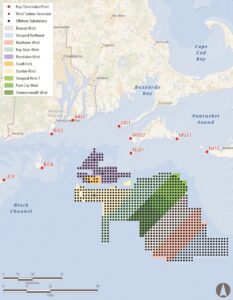The good news is we dodged a couple of bullets, with not one but two tropical systems — both of them passed east of us.
The bad news is we got a nasty groundswell from the storms, and the high-pressure system that was blocking the storms from getting here also brought north and northeast winds, which chilled our waters to as low as 49 degrees F in the Race and low 50s elsewhere. That made the striped bass and bluefish disappear on us, and a tough week of fishing ensued.
The winds eventually turned back to the south and southwest, but water temperatures were slow to recover, and fishing remained slow. The bay, especially, was a dead zone. By Saturday, the water temps finally pushed past 60 degrees and the stripers and bluefish began to show around Peaked Hill Bar, though the bay was still very quiet: lots of baitfish and birds, but nothing in here feeding on them.
Plus, the usual giant tuna bite, which happens in the bay around this time of year, hasn’t materialized yet.
All the whales that were around Peaked Hill have moved back towards Stellwagen Bank, where there is an abundance of food for them. The humpbacks will need to eat well and fatten up as their migration to the Caribbean will be commencing very soon.

There is a new twist in the endeavor to stop wind farm construction offshore in New England. To this point the concerns have focused on whether the seismographic work being done in preparation for windmill construction has caused an unnatural increase in whale mortality. As reported last week, the National Oceanic and Atmospheric Administration and the Marine Mammal Commission are not finding evidence of a connection there.
Now a group representing New England’s fishermen is focusing on the possibility that electromagnetism from the wind farms’ undersea cables could harm fish and lobster populations in the Gulf of Maine. The New England Fishermen’s Stewardship Association has released an “Offshore Wind Research Summary” that makes the point that there is not yet a consensus among scientists about these kinds of impacts, particularly on lobster and haddock. They want a delay on any offshore wind construction until more research is done.
This story is far from over and will have many twists and turns for sure along the way.



